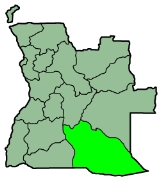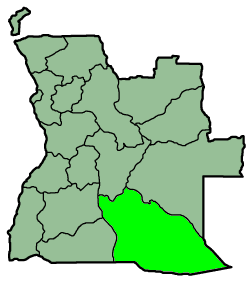
Brazzaville Protocol
Encyclopedia
The Brazzaville Protocol mandated the withdrawal of Cuban troops from Angola
, paving the way for Namibia
's independence through the New York Accords
. Representatives from the governments of Angola
, Cuba
, and South Africa
signed the protocol on December 13, 1988 in Brazzaville
, Congo
.
 In 1981 Chester Crocker
In 1981 Chester Crocker
, U.S. assistant secretary of state for African affairs for newly elected President Ronald Reagan
, had developed a linkage policy
, tying apartheid South Africa
's agreement to relinquish control of Namibia to Cuba's troop withdrawal and peace in Angola. On September 10, 1986 Fidel Castro
made Crocker's proposal a prerequisite to withdrawal from Angola as did the South African government by August 30, 1988. The Angolan and American governments began negotiating in June 1987. The Cuban government joined negotiations on January 28, 1988 and all three parties held a round of negotiations on March 9 in London
. The South African government joined negotiations on May 3 and the parties met in June and August in New York
and Geneva
. All parties approved an outline agreement of Principles for a Peaceful Settlement in South Western Africa on July 20 and agreed to a ceasefire on August 8, 1988.
UNITA
and South African forces stopped and repelled an MPLA advance on UNITA regions in strongholds in Southern Angola ending with the Battle of Cuito Cuanavale
in Cuando Cubango
province from January 13 to March 23, 1988, in the second largest battle in the history of Africa
. UNITA and South Africa retreated after a 15-hour battle on March 23 and moved for negotiations.
Angola
Angola, officially the Republic of Angola , is a country in south-central Africa bordered by Namibia on the south, the Democratic Republic of the Congo on the north, and Zambia on the east; its west coast is on the Atlantic Ocean with Luanda as its capital city...
, paving the way for Namibia
Namibia
Namibia, officially the Republic of Namibia , is a country in southern Africa whose western border is the Atlantic Ocean. It shares land borders with Angola and Zambia to the north, Botswana to the east and South Africa to the south and east. It gained independence from South Africa on 21 March...
's independence through the New York Accords
New York Accords
The Tripartite Accord, Three Powers Accord or New York Accords granted independence to Namibia and ended the direct involvement of foreign troops in the Angolan Civil War...
. Representatives from the governments of Angola
Angola
Angola, officially the Republic of Angola , is a country in south-central Africa bordered by Namibia on the south, the Democratic Republic of the Congo on the north, and Zambia on the east; its west coast is on the Atlantic Ocean with Luanda as its capital city...
, Cuba
Cuba
The Republic of Cuba is an island nation in the Caribbean. The nation of Cuba consists of the main island of Cuba, the Isla de la Juventud, and several archipelagos. Havana is the largest city in Cuba and the country's capital. Santiago de Cuba is the second largest city...
, and South Africa
South Africa
The Republic of South Africa is a country in southern Africa. Located at the southern tip of Africa, it is divided into nine provinces, with of coastline on the Atlantic and Indian oceans...
signed the protocol on December 13, 1988 in Brazzaville
Brazzaville
-Transport:The city is home to Maya-Maya Airport and a railway station on the Congo-Ocean Railway. It is also an important river port, with ferries sailing to Kinshasa and to Bangui via Impfondo...
, Congo
Republic of the Congo
The Republic of the Congo , sometimes known locally as Congo-Brazzaville, is a state in Central Africa. It is bordered by Gabon, Cameroon, the Central African Republic, the Democratic Republic of the Congo , the Angolan exclave province of Cabinda, and the Gulf of Guinea.The region was dominated by...
.
Negotiation

Chester Crocker
Chester Arthur Crocker is an American diplomat who served as Assistant Secretary of State for African Affairs from 1981 to 1989 in the Reagan administration. Crocker, architect of the U.S...
, U.S. assistant secretary of state for African affairs for newly elected President Ronald Reagan
Ronald Reagan
Ronald Wilson Reagan was the 40th President of the United States , the 33rd Governor of California and, prior to that, a radio, film and television actor....
, had developed a linkage policy
Linkage (policy)
Linkage was a policy pursued by the United States of America, championed by Richard Nixon and Henry Kissinger, during the 1970s period of Cold War Détente which aimed to persuade the Soviet Union and Communist China to co-operate in restraining revolutions in the Third World in return for...
, tying apartheid South Africa
History of South Africa in the apartheid era
Apartheid was a system of racial segregation enforced by the National Party governments of South Africa between 1948 and 1994, under which the rights of the majority 'non-white' inhabitants of South Africa were curtailed and white supremacy and Afrikaner minority rule was maintained...
's agreement to relinquish control of Namibia to Cuba's troop withdrawal and peace in Angola. On September 10, 1986 Fidel Castro
Fidel Castro
Fidel Alejandro Castro Ruz is a Cuban revolutionary and politician, having held the position of Prime Minister of Cuba from 1959 to 1976, and then President from 1976 to 2008. He also served as the First Secretary of the Communist Party of Cuba from the party's foundation in 1961 until 2011...
made Crocker's proposal a prerequisite to withdrawal from Angola as did the South African government by August 30, 1988. The Angolan and American governments began negotiating in June 1987. The Cuban government joined negotiations on January 28, 1988 and all three parties held a round of negotiations on March 9 in London
London
London is the capital city of :England and the :United Kingdom, the largest metropolitan area in the United Kingdom, and the largest urban zone in the European Union by most measures. Located on the River Thames, London has been a major settlement for two millennia, its history going back to its...
. The South African government joined negotiations on May 3 and the parties met in June and August in New York
New York
New York is a state in the Northeastern region of the United States. It is the nation's third most populous state. New York is bordered by New Jersey and Pennsylvania to the south, and by Connecticut, Massachusetts and Vermont to the east...
and Geneva
Geneva
Geneva In the national languages of Switzerland the city is known as Genf , Ginevra and Genevra is the second-most-populous city in Switzerland and is the most populous city of Romandie, the French-speaking part of Switzerland...
. All parties approved an outline agreement of Principles for a Peaceful Settlement in South Western Africa on July 20 and agreed to a ceasefire on August 8, 1988.
UNITA
UNITA
The National Union for the Total Independence of Angola is the second-largest political party in Angola. Founded in 1966, UNITA fought with the Popular Movement for the Liberation of Angola in the Angolan War for Independence and then against the MPLA in the ensuing civil war .The war was one...
and South African forces stopped and repelled an MPLA advance on UNITA regions in strongholds in Southern Angola ending with the Battle of Cuito Cuanavale
Battle of Cuito Cuanavale
The Battle of Cuito Cuanavale in 1987/88 was an important episode in the Angolan Civil War . Between 9 September and 7 October 1987, the Angolan Army , in an attempt to finally subdue the Angolan insurgent movement UNITA in south-eastern Angola, was decisively repelled in a series of battles at the...
in Cuando Cubango
Cuando Cubango
Cuando Cubango is a province of Angola and it has an area of 199,049 km² and a population of approximately 140,000. Menongue is the capital of the province. The governor of the province is General Eusebio de Brito. According to 1988 US government statistics, the provincial population was...
province from January 13 to March 23, 1988, in the second largest battle in the history of Africa
History of Africa
The history of Africa begins with the prehistory of Africa and the emergence of Homo sapiens in East Africa, continuing into the present as a patchwork of diverse and politically developing nation states. Agriculture began about 10,000 BCE and metallurgy in about 4000 BCE. The history of early...
. UNITA and South Africa retreated after a 15-hour battle on March 23 and moved for negotiations.
See also
- Alvor AgreementAlvor AgreementThe Alvor Agreement, signed on January 15, 1975, granted Angola independence from Portugal on November 11, ending the war for independence while marking the transition to civil war...
- Bicesse AccordsBicesse AccordsThe Bicesse Accords, also known as the Estoril Accords, laid out a transition to multi-party democracy in Angola under the supervision of the United Nations' UNAVEM II mission. President José Eduardo dos Santos of the MPLA and Jonas Savimbi of UNITA signed the accord in Lisbon, Portugal on May 31,...
- Lusaka ProtocolLusaka ProtocolThe Lusaka Protocol, signed in Lusaka, Zambia on October 31, 1994, attempted to end the Angolan Civil War by integrating and disarming UNITA and national reconciliation. Both sides signed a ceasefire as part of the protocol on November 20.-Negotiation:...
- Nakuru AgreementNakuru AgreementThe Nakuru Agreement, signed on June 21, 1975 in Nakuru, Kenya, attempted to salvage the implementation of the Alvor Agreement which granted Angola independence from Portugal and established a transitional government...
- Tripartite Accord

